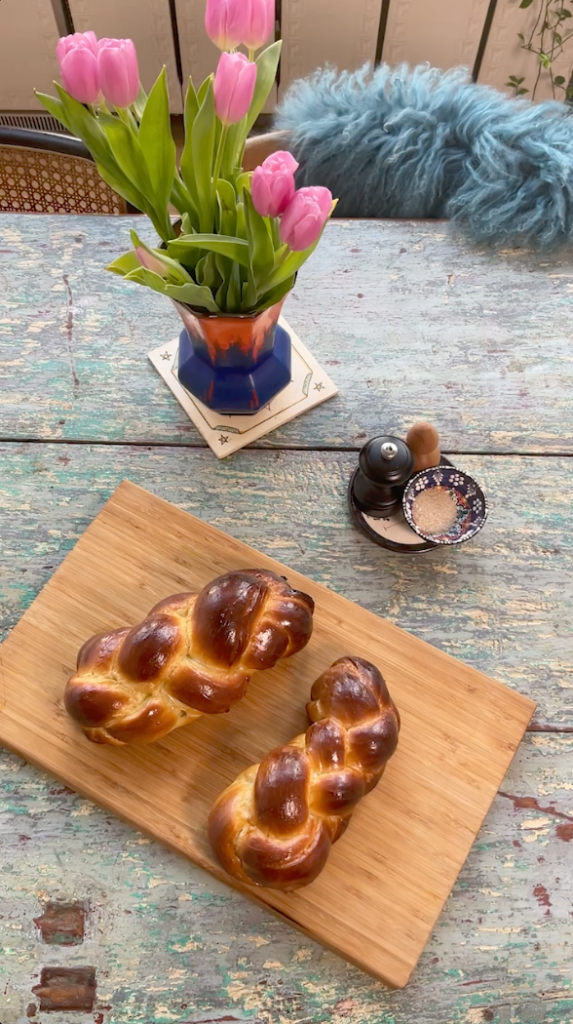Schwiizer Sunntigszopf // Schweizer Butterzopf
Über die Köstlichkeit:
Ein Schwiizer Butterzopf wird traditionell am Sonntagmorgen frisch gebacken.
Daher kann es tatsächlich vorkommen, dass ich sonntags um 6 Uhr aufstehe, nur um zum Brunch eine dicke Scheibe Butterzopf zu genießen. Denn ofenwarm schmeckt er mit Abstand am besten.
Gut zu wissen: Der Zopf schmeckt sowohl mit selbstgemachter Johannisbeermarmelade als auch mit Räucherlachs oder Käse.
Zutaten für einen großen Zopf oder zwei kleine:
Zubereitung
-
Am Abend vor dem Backtag (z.B. Samstagabend):
In einem Schälchen die zimmerwarme Milch mit dem Zucker und der Hefe vermengen, bis sich die Hefe vollständig aufgelöst hat. Zwischenzeitlich die Butter auf Zimmertemperatur aufwärmen.
In einer großen Schüssel (z.B. jener der Knetmaschine) die Mehle mit dem Salz mischen und langsam die Hefemilch dazugeben, grob verrühren. Dann die Knetmaschine/Küchenmaschine mit Knethacken anwerfen und den Teig für 5 Minuten auf niedriger Stufe kneten. Langsam die weiche Butter in kleinen Würfeln dazugeben und für weitere 5- 10 Minuten weiter kneten, bis die Masse homogen ist. Den Teig mit einem feuchten Tuch abdecken und für etwa eine Stunde bei Raumtemperatur gehen lassen.
Anschließend den Teig in beispielsweise eine Plastiktüte umfüllen luftdicht verschließen und Übernacht im Kühlschrank (bei etwa 8 °C) ruhen lassen.
Am nächsten Morgen (Backtag) den Teig aus dem Kühlschrank entfernen und für etwa 15 Minuten bei Zimmertemperatur aufwärmen lassen. Nun geht es ans Flechten: Aus dem Teig zwei gleichgroße Teile bilden und mit Rollbewegungen und leichtem Ziehen zu zwei ein Meter langen Strängen formen. Über Kreuz legen und abwechslungsweise von oben nach unten und von links nach rechts flechten. Das dünne Ende gut zusammendrücken und unter den Zopf nach hinten klappen.
Den Zopf auf Backpapier legen und mit einem aufgeschlagenen und verquirlten Ei bepinseln. Für weitere 60 Minuten ruhen und aufgehen lassen.
Nach der Halbzeit der Stückgare den Ofen mit Blech auf 200 °C (ohne Umluft!) vorheizen.
Bevor der Zopf in den Ofen kommt nochmals großzügig mit dem restlichen Ei bestreichen, dann mitsamt dem Backpapier auf das nun heiße Blech legen und für 40 Minuten golden backen.
Zuletzt den Zopf mit etwas Milch bepinseln und noch laufwarm zum Sonntagsfrühstück reichen.
Note
A Swiss butter plait is traditionally made fresh on a Sunday morning.
Thus, it actually happens that I get up at 6 a.m. on a Sunday just to enjoy a thick fresh slice of braid with butter for brunch.
After all, it tastes by far best when warm from the oven.
Good to know: The bred tastes delicious with homemade redcurrant jam as well as with smoked salmon or cheese.
Ingredients:
- 250 g spelt flour, light
- 250 g all-purpose flour
290 ml milk, lukewarm - 10 g fresh yeast
- 1 egg
- 30 g sugar
- 10 g salt
- 60 g butter
Preparation:
The evening before the baking day (e.g. Saturday evening): In a small bowl, mix the simmering milk with sugar and the yeast until it has completely dissolved. In the meantime, warm the butter to room temperature.
In a large bowl (e.g. that of the kneading machine), mix the flours with the salt and slowly add the the yeast-milk, mixing roughly. Then start the kneading machine and knead the dough for 5 minutes at low speed. Slowly add the softened butter in small cubes and continue kneading for another 5-10 minutes until the mixture is smooth. Cover the dough with a moist towel and leave to rise at room temperature for about an hour.
Then place the dough in a plastic bag, for example, seal it airtight and leave it to rest overnight in the refrigerator (at about 8 °C).
The next morning (baking day), remove the dough from the fridge and let it warm up at room temperature for about 15 minutes. Now it' s time to braid: Form two equal-sized pieces from the dough and shape them into two one-metre-long strands by rolling and gently pulling. Lay them crosswise and weave alternately from top to bottom and from left to right. Press the thin end well together and fold it back under the plait.
Place the plait on baking paper and brush with a beaten and whisked egg. Leave to rest and rise for a further 60 minutes.
Halfway that time, preheat the oven with the tray to 200 °C (without convection!).
Before placing the plait in the oven, cover generously with the remaining egg, then place on the hot tray with the baking paper and bake for 40 minutes until golden.
Finally, brush the plait again with a little milk and serve it still warm for a Sunday breakfast.



